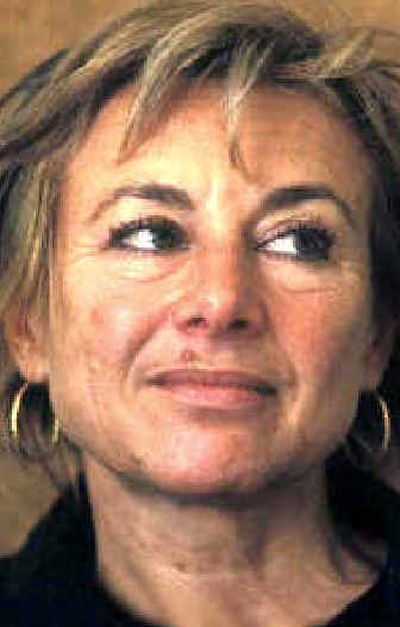Journalist challenges U.S. claims

ROME – Left-wing journalist Giuliana Sgrena claimed American soldiers gave no warning before they opened fire and said Sunday she cannot rule out that U.S. forces intentionally shot at the car carrying her to the Baghdad airport, wounding her and killing the Italian agent who had just won her freedom after a month in captivity.
An Italian Cabinet member urged Sgrena, who writes for a communist newspaper that routinely opposes U.S. policy in Iraq, to be cautious in her accounts and said the shooting will not affect Italy’s support for the Bush administration.
The White House called the shooting a “horrific accident” and restated its promise to investigate fully.
Sgrena’s editor at the daily Il Manifesto, Gabriele Polo, said Italian officials had told him 300 to 400 rounds were fired at the car. Italian military officials said two other intelligence agents were wounded in the shooting; U.S. officials said only one other agent was hurt.
Without backing up the claim, Sgrena said she believes it is possible she was targeted because the United States objected to methods used to secure her release.
“The fact that the Americans don’t want negotiations to free the hostages is known,” the 56-year-old journalist told Sky TG24 television by telephone, her voice hoarse and shaky. “The fact that they do everything to prevent the adoption of this practice to save the lives of people held hostage, everybody knows that. So I don’t see why I should rule out that I could have been the target.”
Sgrena said she knew nothing about a ransom payment, and no details have emerged about how authorities won her release. An Italian Cabinet minister said money likely changed hands.
U.S. officials object to ransom payments or negotiation with kidnappers, claiming that only encourages further hostage-taking.
The shooting has fueled anti-American sentiment in a country where people have deeply opposed the war in Iraq, but it did not provoke mass protests this weekend like those that have drawn tens of thousands of people into the streets.
At least 10,000 people, however, lined up in the rain to pay their respects to Nicola Calipari, the agent who died trying to shield Sgrena from the American bullets.
Draped in an Italian flag, his casket lay in state at Rome’s Vittoriano national monument, which houses the tomb of the unknown soldier. A state funeral was planned for today and Calipari has been awarded the gold medal of valor posthumously.
Calipari was struck in the temple by a single round and died instantly, the ANSA news agency reported, quoting doctors who did an autopsy.
White House counselor Dan Bartlett said Sunday the shootings were a “horrific accident,” saying President Bush called Italian Premier Silvio Berlusconi to offer condolences and promise a full investigation.
“As you know, in a situation where there is a live combat zone, particularly this road to the airport, has been a notorious area for car bombs, that people are making split-second decisions, and it’s critically important that we get the facts before we make judgments,” Bartlett said on CNN’s “Late Edition.”
The U.S. military has said the car Sgrena was riding in was speeding and Americans used hand and arm signals, flashing white lights and warning shots to get it to stop at the roadblock.
But in an interview with Italian La 7 TV, Sgrena said, “There was no bright light, no signal.” She also said the car was traveling at “regular speed.”
The shooting was a setback for Berlusconi, who has kept 3,000 Italian troops in Iraq despite the public opposition at home, and both sides appeared to be moving swiftly to contain the damage.
Communications Minister Maurizio Gasparri urged Sgrena to be more careful about what she said.
“I understand the emotion of these hours, but those who have been under stress in the past few weeks should pull themselves together and avoid saying nonsense,” ANSA quoted Gasparri as saying.
Gasparri also said the shooting would not affect Italian support for efforts to secure postwar Iraq. “The military mission must carry on because it consolidates democracy and liberty in Iraq,” he said.
Sgrena, who gave a series of interviews to Italian reporters from her hospital bed in Rome, revealed few details about the circumstances surrounding her release by the insurgents but said her captors blindfolded her and drove her some distance before turning her over to the Italians, who headed directly for the airport.
Asked whether ransom was paid, Agriculture Minister Giovanni Alemanno said it was “very probable.” An Iraqi politician, Younadem Kana, said he had “nonofficial” information that $1 million was paid, Italy’s Apcom news agency reported, although that could not be confirmed.
“I remember only fire,” Sgrena wrote in Il Manifesto. “At that point a rain of fire and bullets came at us, forever silencing the happy voices from a few minutes earlier.”
She said the driver began shouting that they were Italian, then “Nicola Calipari dove on top of me to protect me and immediately, and I mean immediately, I felt his last breath as he died on me.”
In an interview with RAI, Italian state television, Sgrena recounted her final moments before freedom: “When they let me go, it was a difficult moment for me because they told me, ‘The Americans don’t want you to return alive to Italy.’ “
Sgrena, who was abducted Feb. 4 by gunmen outside Baghdad University and later pleaded for her life in a videotape, returned to Rome on Saturday. She said she had no intention of going back to Iraq. Her captors, she said, made it clear that “they do not want witnesses, and we are all perceived as possible spies.”